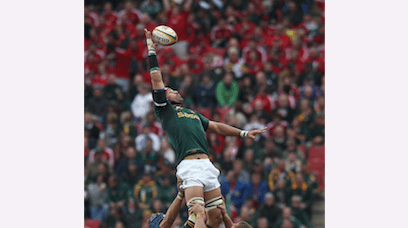The dice of fate has tumbled across the British and Irish Lions tour of Australia, as both sides prepare for this weekend’s series-deciding, third Test in Sydney.
Firstly, the Wallabies were set to loose captain James Horwill after the International Rugby Board decided to review a decision clearing him of foul play in the first Test. Reviews are rare, so rumours were rife that Horwill would be suspended.
One theory was that the IRB intended to ban Horwill to give the Lions a leg-up in the series. Sydney rugby writer Spiro Zavos even accused the IRB of “bully-boy hostility” toward Australia.
However, Horwill was cleared.
By contrast, the Lions lost hard-working captain Sam Warburton, through a hamstring strain—he left the field in the 67th minute of the second Test. His on-field absence will unquestionably hurt the Lions.
Secondly, the much-vaunted Lions scrum has been matched by the much-criticised Wallaby forwards. As the scrum is the doorway to victory, this greatly narrows the gap between the two sides.
Both Tests have been close, with the Lions winning the first 21-23 when Wallaby fullback Kurtley Beale missed a match-winning penalty on full time of the first Test.
Beale was kicking because young inside-centre Christian Leali’ifano was knocked-out in the opening minutes. Back for Test two, Leali’ifano personified composure, in play and with the boot.
Lions coach Warren Gatland blamed his side for the 16-15 loss, saying errors, poor control at the breakdown and poor use of territory cost his side dearly.
“It’s just about game management,” he said. “We felt pretty comfortable at half time, but it just shows that they never give up ...”
In a sense, the Lions gave up. Instead of attacking the Wallabies as they had in Test one, they focussed more on containment, as if they feared the attack of players like Israel Falou, Beale and James O’Connor.
The Lions not only contained the Wallaby backs, but they forced them into a number of errors. So the conservative policy worked – but the Lions lost.
With 10 minutes to go, the Lions were in front 15-9 in Melbourne. But then O’Connor sparked an attack that resulted in a try to the reliable Wallaby centre Adam Ashley-Cooper.
Lions flyhalf Jonathan Sexton said the side was shattered by the loss. Like the coach, he said the Lions had played poorly.
“We are all pretty devastated to be honest,” he said. “At times it felt we were wishing the game to finish—rather than going out and going after it.”
I expect the Lions to attack more in Sydney on Saturday night (July 6). The Test is there to be won—and fortune usually favours the brave in rugby. Still, Test victories are underpinned by defence.
I expect the Wallabies to attack for the same reason—the series is there to be won.
Coach Robbie Deans favours defence, but his young players are attack oriented. The disrupted back-line found some stability in Melbourne, which will add experience to their personal belief, which will bolster their confidence.
Ashley-Cooper said the Wallabies played poorly in attack, though the defence was virtually faultless.
“We made a lot of improvements from game one,” he said, “but we certainly feel we’ve got a lot more improvements to make.
“We’ve got too many threats in the back-line to waste, so we’re hoping to get the ball into the wider channels this week.”
Deans himself is one game away from an historic victory, but he continues to divide Australian fans. Much of that criticism will continue, even if the Wallabies win.
Because of that, Deans desperately needs to win.
The Lions too are desperate. The last time they won was over a decade ago, in 1997, against the Springboks in South Africa.
Desperate times call for desperate measures, like, strangely, trying to win, instead of trying not to lose.
Both teams will literally be running out of their comfort zones, producing who knows what excitement.
Underlying everything is the life-and-death nature of the Test: the winner takes all.
Peter Lalanabaravi is a rugby writer with over 30 years experience.




